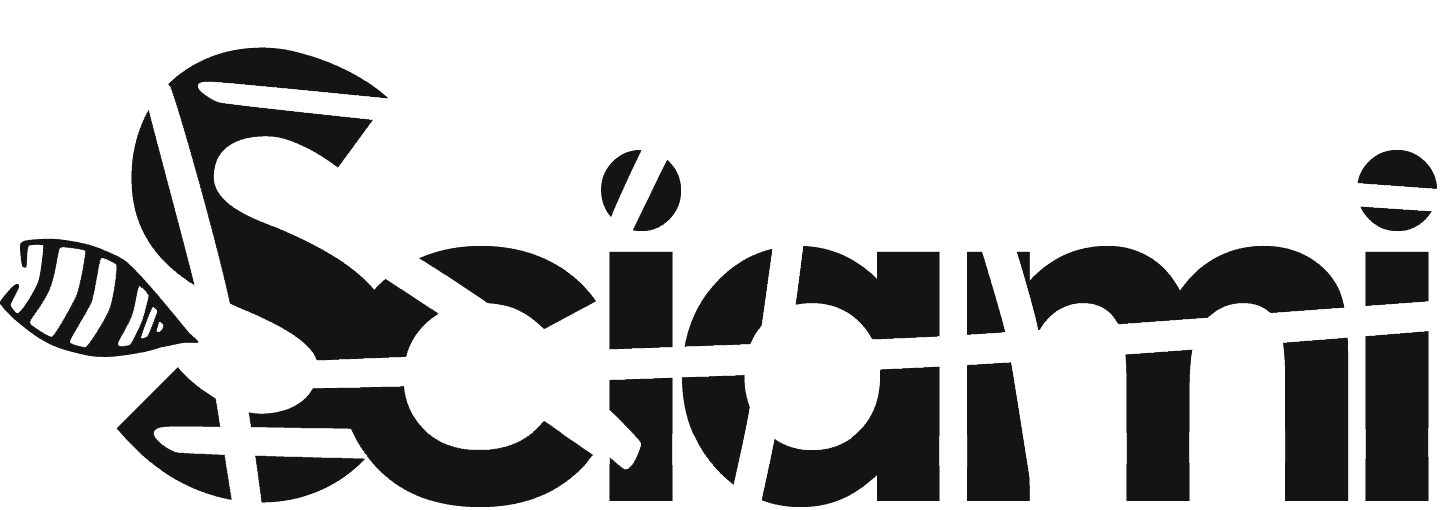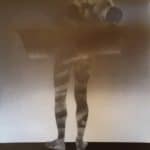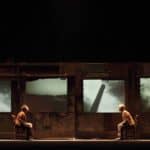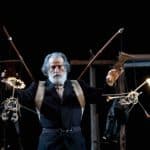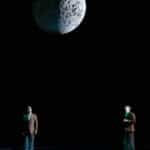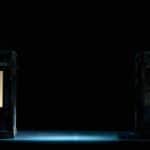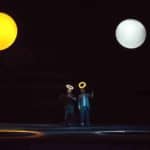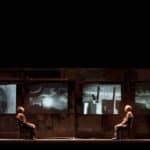Lucio. 1978.
directed by Alberto Ardizzone
scenes by Giovanni Lo Cicero
with Alberto Ardizzone, Fabio Cangialosi, Gaspare Cucinella, Toti Giambertone, Marisa Randi, Franco Scaldati, Patrizia Urso
production Cooperativa Teatrale Gruppo 5
premiere Partinico, 1978
Lucio. 1990.
directed by Chérif
scenes and costumes Tobia Ercolino
music by Bruno De Franceschi
with Maria Amato, Gaspare Cucinella, Elvira Feo, Paolo La Bruna, Vito Savalli, Franco Scaldati
production Piccolo Teatro Città di Palermo
premiere Milan, Teatro dell’Elfo, December 1990
Lucio. 2014.
directed by Franco Maresco
with Mimmo Cutcchio, Melino Imparato, Gino Carista
scenes and costumes Cesare Inzerillo and Nicola Sferruzza
original music by Salvatore Bonafede
video editing by Francesco Guttuso and Giuliano La Franca
production Teatro Biondo.
premiere Palermo, Teatro Biondo, 8-13 April 2014
Straccioni e commedianti verso l’utopia di Lucio
by Viviana Raciti
Initially presented with the name In the Shape of a Rose (1976), Lucio was staged between 1977 and 1978 but only published 20 years later in a collection edited by Valentina Valentini; the volume also includes an audio recording of Scaldati playing every one of the piece’s characters. Scaldati’s choice to record each voice is intimately connected to the meaning of the text, which is built around the myth of ‘Lucio’ who is at the same time a movement towards the light and manure, essence of the theatre and mutilated man. Lucio is not merely the brilliant memorable actor or its much more mediocre version which appears on stage: every character appears to exist on stage as a choral expression of that single idea of a character, a declination of an aspiration towards the light, which is the poetic élan of Scaldati’s oeuvre as a whole.
The characters are angels, children, rag-doll mice, tramps and actors. None of them present a clear psychological set-up, and the situations in which they exist – more than the situations in which they act – are the only clues we get to understanding them. We deduce fragments of information about the bodies of Crocifisso, Pasquale and of Lucio: we know that they’re deformed, that one is legless, that one is blind and that Lucio – we learn towards the end of the text – is a hunchback and is missing an arm. While for the first two characters the effects of mutilation create a strong interdependence of the two characters on stage, Lucio’s mutilation is always seen as a limitation and as an object of derision by his partner. We know little about these individual characters, but we know that they have a total lack of nastiness, of evil: Lucio and Illuminata talk, eat, play, they make plans for the future; Illuminata speaks to some flowers, and none of these actions bear a real weight on the performance’s narrative progression. Like the two mice which appear – called Ziù and Zié – all the characters appear to fantasise about a long-gone era, often paired with a food which no longer exists (the mice remember the cheese and the milk the moon was made of, Pasquale and Crocifisso recall the names of foods – all typical Sicilian dishes – which they might have savoured some day). Some characters are awoken from their dreams, other even get killed, as Crocifisso will, murdered by his companion Pasquale and resuscitated by two angels, Ancilù and Ancilà, whose task the spectators will understand – in its ruinous consequences – only as the action progresses.
Documents are published in original language. In case the translation is present, both the original and the translation are published.
Franco Scaldati, Lucio. Primo estratto, from p. 14 on p. 35. Translation in front of Antonella Di Salvo, in Valentina Valentini, Franco Scaldati, Rubbettino Editore, Soveria Mannelli 1997.
Franco Scaldati, Lucio. Secondo estratto, from p. 76 on p. 91. Translation in front of Antonella Di Salvo, in Valentina Valentini, Franco Scaldati, Rubbettino Editore, Soveria Mannelli 1997.
Franco Scaldati, Lucio. Terzo estratto, from p. 104 on p. 113. Translation in front of Antonella Di Salvo, in Valentina Valentini, Franco Scaldati, Rubbettino Editore, Soveria Mannelli 1997.
Lucio, 1990
video direction Agata Guttadauro
Lucio, 1997
Parma, 7 September 1997 at the Casino dei Boschi di Carrega
registration of a version interpreted exclusively by Franco Scaldati and attached to the volume V. Valentini, Franco Scaldati , Rubbettino, Soveria Mannelli 1997
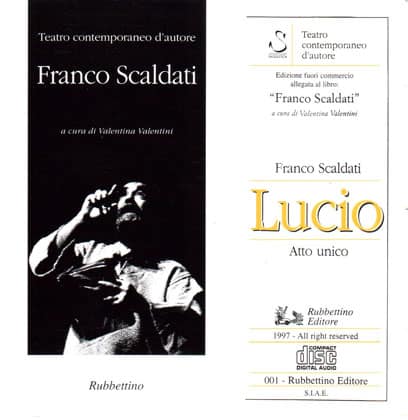
Guido Valdini, Storie di Guitti, «L'Ora», January 20, 1978.
Roberto Giambrone, E Lucio sposò terra e cielo, «L'Ora», April 10, 1989.
Anna Bandettini, Due personaggi in cerca d'amore, «la Repubblica», December 5, 1990.
Oliviero Ponte Di Pino, I barboni sognano la luna, «Il Manifesto», December 8, 1990.
Franco Quadri, I sogni dei barboni, «la Repubblica», December 8, 1990.
Maria Grazia Gregori, Nel teatro dei fantasmi di Pasquale e Crocifisso, «l'Unità», December 11, 1990.
Roberto Alajmo, Lo stupore della vita, «Giornale di Sicilia», February 4, 1991.
Fulvio Baglivi, Nell’abisso nero di Palermo tra pupi, pazzi, e puri di cuore, «il Manifesto», May 3, 2014.
Valentina Valentini, Lucio di Franco Scaldati, «Alfabeta2», May 4, 2014.
Valentina Valentini, Il giardino incantato. Sulla drammatrugia di Franco Scaldati, in Valentina Valentini (edited by), Franco Scaldati, Soveria Mannelli, Rubbettino editore 1997.
Valentina Valentini, Prima del teatro: Lucio, a che punto è la notte, in «Close up», September 2000.
Libretto di sala, Lucio, 2014, Biondo Theater Production; Ferrarastudio graphic project; photo Ninni Annaloro.
